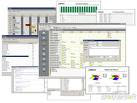Internet is undoubtedly a fantastic resource for families and offers a rich vein of educational content.
However, there are dangers - Welcome to the seedy world of viruses, spam, trojans, pornography, spyware and other crap.
These are the Top Twelve Threats No computer should ignore users.
1. Virus - A computer program that copies itself. Often disrupt the computer system or damage your data. Viruses are usually received via e-mailSystems in a careful opening anything from a dubious source. It can strike anyone, for example, the effects on the destructive Mydoom worm of a company of three small and medium size.
2. Spyware - Sends information about you and your computer with someone else. Spyware can the addresses of sites visited, or worse, post, transmit personal information. With today's concerns for identity theft is to make a real worry. For example, CoolWebSearch may seizure WebSearches, home page and other settings in Internet Explorer. Spyware is often downloaded as part was shareware or freeware from the Internet.
3. IP Spoofing - A technique for indicating unauthorized access to computers, whereby the intruder sends messages to a computer with the address that the message comes from a host of confidence to win.
4. Trojans - An apparently legitimate computer program that is actually intended to stop the activities of the computer and the damageThe sending of information, perhaps even passwords to third parties without your knowledge. How, for example, recent emails entitled "Osama Bin Laden Captured" attempted to download the "Trj / Small.B. Trojan if the embedded URL was clicked. The Trojan attempts to abuse the PC.
5. Spam - Unsolicited mail often promoting products of dubious financial or sexual. Leave your email address on websites and message boards where they are harvested by spammers.
6.Adware - puts advertisements on the screen. These take many forms, including pop-ups, pop-unders and ads that appear later, even if the browser is closed. Some use the Windows Messenger service, which a spammer a message directly to the computer sequentially sending messages to IP addresses directly as possible. Always irritating, but are also often pornographic.
7. Dialer - for those of us still with dial-up modem, dialer programsDiverting calls to a number very expensive. They do not know until you get the bill.
8. Hijackers - Hijackers take control of your web browser and can be your home page, search bar and search pages of reset. You can redirect an end to unwanted sites, or if you want certain websites.
9. Hackers - With so much personal information online available to anyone with a secure password, which you must make sure your password. If you use your mother's maiden name and the name of the name of your cat orForget your birthday is in danger. Here are two tips on how to create a secure password. Method Man - Pick independent, two words at random, with three letters and two numbers. Mix them and what do you have? A secure password such as "red19cat" or "hotpin73. Method Two - pick a short sequence of words such as Now Is The Winter of our discontent Made Glorious' and you have the password" nitwoodmg. You can change, and the numbers I and O.
10. Phishing - e-mail allegedlyfrom reliable sources such as PayPal, eBay or your bank. Often you want to verify information about your account, can look very realistic but are generally scams to harvest usernames and passwords. Always open a new browser winder and type the address there, rather than clicking on the link provided.
11. Hoaxes - Chain letters, scams, false alarms. At best, take time and bandwidth, but at worst could jeopardize the victims of fraud. Pass it on!
12.Stranger-danger - For those of us with children - who knows what they actually do when I'm online? Work on homework, downloading illegal music or pornography? Or are they chatting to strangers in chat rooms? You should consider blocking access to undesirable sites and logging their activity with a surveillance system. Oh, and do not forget that where children are concerned, computers should always be kept in a family room and never in his bedroom.
ThreeStep Action
There are three basic, essential steps to be taken to ensure that the PC is always free of risks.
Firstly, be sensible when opening attachments or e-mail instructions from apparently reliable websites.
Secondly, make sure you are using the latest service pack of Windows as Microsoft narrows once again to fill the gaps in security.
Finally, there are a number of tools at low cost as firewalls, virus protection, spam --Blockers and spyware killers available. Like everything else, they vary in quality and you tend to get what you always do to make your research first and perhaps try a free trial before paying the credit card.
